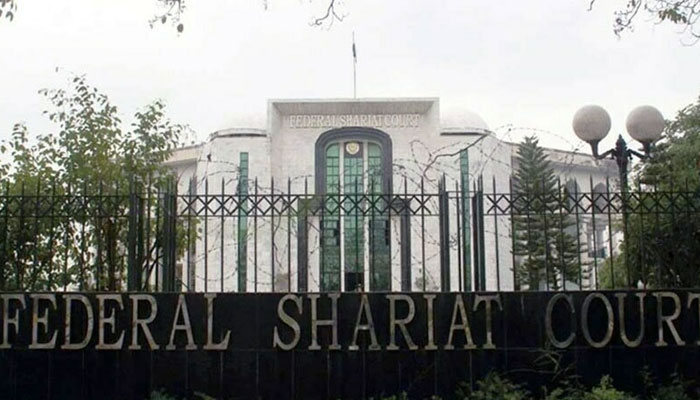Gender change at will illegal, void: FSC
Federal Shariat Court observed that any law, rule or regulation giving a person’s gender legal precedence over sex was illegal
ISLAMABAD: The Federal Shariat Court (FSC) Friday observed that any law, rule or regulation giving a person’s gender legal precedence over sex was illegal and void being against the injunctions of Islam as laid down in the Holy Quran and Sunnah of the Holy Prophet (PBUH).
A two-member bench — comprising acting Chief Justice Dr Syed Muhammad Anwar and Justice Khadim Hussain M Shaikh — announced the reserved judgment on the Shariat petitions, challenging various sections of the Transgender Persons (Protection of Rights) Act, 2018 (hereinafter referred to as “Impugned Act/Law”) and provisions of the Transgender Persons (Protection of Rights) Rules, 2020 made under Section 20 of the impugned Act.
In addition to that some of the petitioners had challenged Regulation 13(1) of the National Database and Registration Authority (Application for National Identity Card) Regulation, 2002 made under the National Database and Registration Authority Ordinance, 2000.
They had also challenged policy followed by the National Database and Registration Authority (hereinafter referred to as “NADRA”) regarding registration of transgender persons pursuant to the Transgender Persons (Protection of Rights) Act, 2018 i.e. the impugned Act.
Authored by the acting Chief Justice Dr Syed Muhammad Anwar, the judgment declared Section 7 of the impugned Act — which talks about the “Right of inheritance” of “transgender person” — as against the injunctions of Islam as laid down in the Holy Quran and Sunnah, as no one can get any share of inheritance on the basis of “self-perceived gender identity” which is possible under Section 7 read with other sections of the impugned Act.
The court held that the Holy Quran had categorically stated in many verses that Allah had created human beings either male or female adding that every human being was an offspring of male and female upon which the concept of sex and gender of Islam was based according to the teachings of Islam.
“This clearly means that no one is allowed to act opposite to his or her sex. Hence, according to Islamic injunctions as laid down in the Holy Quran and Sunnah of the Holy Prophet (PBUH), the sex of any person has precedence over the gender of any person, be it male or female; therefore, any law, rule or regulation which gives the gender of a person legal precedence over sex is illegal and void being against the injunctions of Islam as laid down in the Holy Quran and Sunnah of the Holy Prophet (PBUH)”, says the judgment.
The court held that according to the injunctions of Islam as laid down in the Holy Quran and Sunnah, all the legal shares of inheritance are to be divided among the legal heirs of the deceased on the basis of their biological sex.
“As we have already decided hereinabove in the light of verses of Holy Quran and the Hadiths of the Holy Prophet (PBUH), a person’s sex has precedence over gender of that person, be it male or female”, says the judgment adding that the gender of a person cannot be made the basis of identity of that person.
“Hence, the use of term “transgender” for gender identity on the basis of self-perceived identity, which is contrary to the biological sex of the person, is also against the injunctions of Islam”, the judgment noted.
The court held that Section 2(f) containing definition of “gender identity”, Section 2(n)(iii), Section 3 and Section 7 of the impugned Act, titled, “The Transgender Persons (Protection of Rights) Act, 2018” was against the injunctions of Islam as laid down in the Holy Quran and Sunnah of the Holy Prophet (PBUH) and will cease to have any legal effect immediately. “Hence, the Shariat petitions challenging the Transgender Persons (Protection of Rights) Act, 2018 are accepted in view of above terms. Consequently, the provisions of the Transgender Persons (Protection of Rights) Rules, 2020 relating to the above mentioned Sections of the impugned Act, which have been declared as against the injunctions of Islam, shall also cease to have legal effect”, the court ruled.
The court, however, held that the pending Shariat Misc. Application having become infructuous is hereby disposed of.
Similarly, the court disposed of the petitions, challenging Regulation 13(1) of the National Database and Registration Authority (Application for National Identity Card) Regulation, 2002 for being infructuous as the court noted that the impugned Regulation 13(1) had been deleted by the Nadra during the proceedings of these petitions through the National Database and Registration Authority (Application for National Identity Card) (Amendment) Regulations, 2022.
“We have heard the arguments of the parties and experts at length, reviewed the research and other material provided by the parties as discussed hereinabove and we have come to the conclusion to firstly declare that according to Islamic injunctions as laid down in the Quran and Sunnah, the gender of a person is subject to the biological sex of a person; therefore, the gender of a person must conform to the biological sex of a person”, says the judgment
The court held that the basis of this declaration was that, there were many rulings or Ahkamat and Ibadaat of Islam which were subject to biological sex of a person and not the gender of a person, such Ahkamat (include performance of salat keeping of Som, performance of Haj and distribution of inheritance, etc. 88.
“We have noticed that in Section 2(n) of the Impugned Act five different terms; namely (i) intersex, (ii) eunuch, (iii) transgender man, (iv) transgender woman and (v) Khwaja Sira are included in one definition of ‘transgender person’. Whereas, the terms Intersex, Eunuch and Khawaja Sira refer to biological variations in sex characteristics of a person that do not fit into male or female classification, while the ‘transgender man’ and ‘transgender woman, refer to individuals whose self-perceived gender identity differs from the sex they were assigned at birth or from the sex they have biologically”, the court held.
The court noted that inclusion of all these different terms in one single term was the main cause of confusion and conflation about the impugned Act because not only all those persons who fall within the category of any of the five category of persons used in section 2(n) are different physically but the ruling of Islamic injunctions according to Quran and Sunnah about them are also different on the basis of their biological sex.
The court held that Islamic injunctions recognize the existence of intersex person. In Arabic such persons are called Khunsa and in Urdu they are called Khusra (as is also mentioned in Section 2(n)(i); therefore, this section 2(n) (i) of the impugned Act which defines the term intersex (Khusra) is not against the injunctions of Islam. Islamic law and jurisprudence provide intersex person all those rights which are mentioned in the impugned Act. Even an Islamic state may take affirmative actions to support intersex persons being special persons who are members of a discriminated community and are deprived of their fundamental rights which are guaranteed by our religion.
“They are entitled to each and every fundamental right provided by the Constitution of Pakistan 1973 to every citizen of Islamic Republic of Pakistan. Similarly, Islamic injunctions do recognize the existence of eunuch persons, who are called Khasi (in Arabic as well as in Urdu (they are also called Khawaja Sira (in Urdu) 46, which term is wrongly placed in Section 2(n)(iii) instead of Section 2(n)(ii) being the Urdu translation of English word, eunuch”, says the judgment.
The court noted that eunuchs were considered as male with serious and permanent sexual infirmity in their sexual organs adding that they also fall in the category of special persons and deserve special attention of the society and the state.
“Hence, Section 2(n)(ii) of the Impugned Act is not against the injunctions of Islam but needs clarity as identified hereinabove that according to Islamic injunctions a person cannot undergo castration to become eunuch at his will”, says the judgment adding that it is only allowed on medical requirement and on medical grounds.
The court however, noted that Section 2(n)(iii) of the impugned Act was against the injunctions of Islam for the reasons stated and discussed in this judgment that many Islamic Ahkammat and Ibadat are applicable on the basis of biological sex of a person (male or female) which cannot be based on the innermost feelings of a person (male or female) or self-perceived identity about his or her “gender” being different from the sex he or she has since birth; therefore, we have declared Section 2(n)(iii) of the Impugned Act as against the injunctions of Islam.
The court further noted that Section 3 of the impugned Act allows a person to get his or her “gender identity” changed from his or her biological sex in identity documents including with Nadra on the CNIC, CRC, driving licence and passport etc.
Hence, by permitting any person, male or female, to change his or her gender in accordance with his or her inner feelings, or self-perceived identity, which may not conform to the sex assigned to that person at the time of birth), will create many serious religious, legal and social problems in society”, says the judgment.
“We are also inclined to accept the arguments of the petitioners that on the basis of ‘prohibition against discrimination’ as envisaged in section 4 of the impugned Act, the right to privacy of females in our society will become vulnerable and can be violated”, says the judgment.
“As stated herein before that this law will pave the way for criminals in society to easily commit crimes like sexual molestation, sexual assault and even rape against females because this law makes it easy for a biological male to get access to the exclusive spaces and gatherings of females in the disguise of a “transgender woman,” the court ruled.
“Hence, blocking the way of evil in a society is the duty of the state under the principles of Sadd az-Darai or the principle of blocking of evil. Hence, Section 3 of the Impugned Act is declared against the injunctions of Islam as laid down in the Holy Quran and Sunnah as the biological sex of a person can only determine the gender identity of a person male or female”, the judgment concluded.
In its reaction, the Human Rights Commission of Pakistan (HRCP) said it was greatly dismayed by the court’s ‘regressive’ ruling.
“In denying trans persons the right to self-perceived gender identity, this move seeks the erasure of an entire demographic and its fundamental rights. Moreover, the ruling undermines the will of the Parliament. The HRCP hopes that the Supreme Court will overturn this decision. The Parliament must not amend this act at any cost,” the statement added.
-
 Cardi B Finally Responds To Accusations About Destroying 'SNL' Set After Nicki Minaj Joke
Cardi B Finally Responds To Accusations About Destroying 'SNL' Set After Nicki Minaj Joke -
 Gorton And Denton By-election Result: Green Party Defeats Labour In Blow To Keir Starmer
Gorton And Denton By-election Result: Green Party Defeats Labour In Blow To Keir Starmer -
 Jack Dorsey Cuts 4,000 Roles, Says AI Requires Smaller Teams
Jack Dorsey Cuts 4,000 Roles, Says AI Requires Smaller Teams -
 Reggie Bannister Health Takes ‘difficult Turn’ Amid Dementia, Parkinson’s Battle
Reggie Bannister Health Takes ‘difficult Turn’ Amid Dementia, Parkinson’s Battle -
 'Humble Traitor' Rob Rausch Makes Unexpected Move After Betraying Maura Higgins In Season 4
'Humble Traitor' Rob Rausch Makes Unexpected Move After Betraying Maura Higgins In Season 4 -
 Sarah Ferguson Drops An Accusation Against Andrew? ‘He Just Wants Leverage’
Sarah Ferguson Drops An Accusation Against Andrew? ‘He Just Wants Leverage’ -
 Anthropic Rejects Pentagon Military AI Proposal, Holds Firm On Safety Guardrails —What’s Next?
Anthropic Rejects Pentagon Military AI Proposal, Holds Firm On Safety Guardrails —What’s Next? -
 'Traitors' Reunion Drama: Rob Rausch Defends Strategy, Makes Shocking Revelation After Victory
'Traitors' Reunion Drama: Rob Rausch Defends Strategy, Makes Shocking Revelation After Victory -
 Inside Hillary Clinton’s Epstein Testimony: Key Takeaways And Highlights Explained
Inside Hillary Clinton’s Epstein Testimony: Key Takeaways And Highlights Explained -
 'Too Hard To Be Without’: Woman Testifies Against Instagram And YouTube
'Too Hard To Be Without’: Woman Testifies Against Instagram And YouTube -
 Kendall Jenner Recalls Being ‘too Stressed’: 'I Want To Focus On Myself'
Kendall Jenner Recalls Being ‘too Stressed’: 'I Want To Focus On Myself' -
 Ethel Kennedy’s 34 Grandchildren And The Expanding Kennedy Family Legacy
Ethel Kennedy’s 34 Grandchildren And The Expanding Kennedy Family Legacy -
 Dolly Parton Achieves Major Milestone For Children's Health Advocacy
Dolly Parton Achieves Major Milestone For Children's Health Advocacy -
 'The White Lotus' Creator Mike White Calls 'Survivor' Fans 'sadistic'
'The White Lotus' Creator Mike White Calls 'Survivor' Fans 'sadistic' -
 Oilers Vs Kings: Darcy Kuemper Pulled After Allowing Four Goals In Second Period
Oilers Vs Kings: Darcy Kuemper Pulled After Allowing Four Goals In Second Period -
 Calgary Weather Warning As 30cm Snow And 130 Km/h Winds Expected
Calgary Weather Warning As 30cm Snow And 130 Km/h Winds Expected




